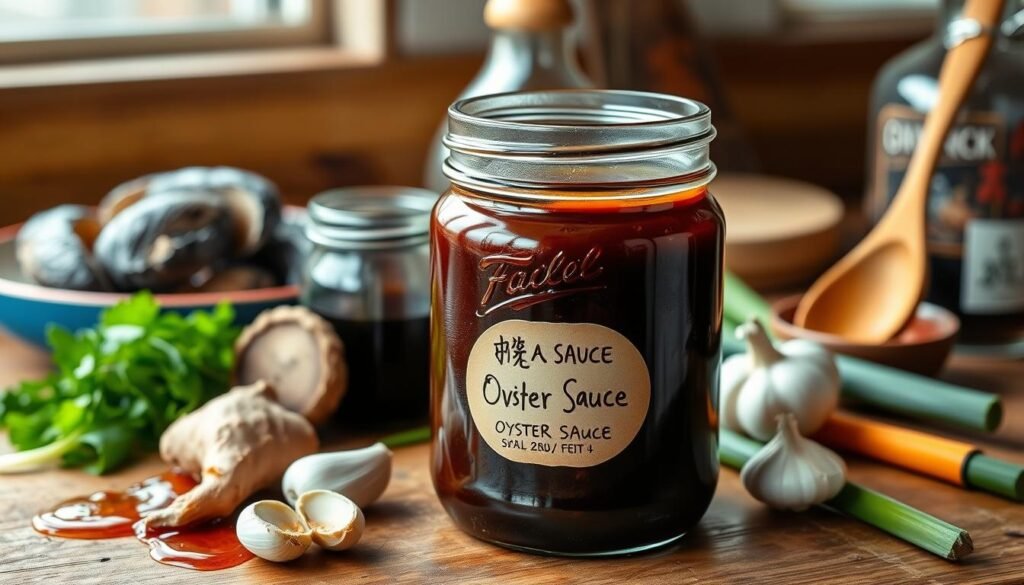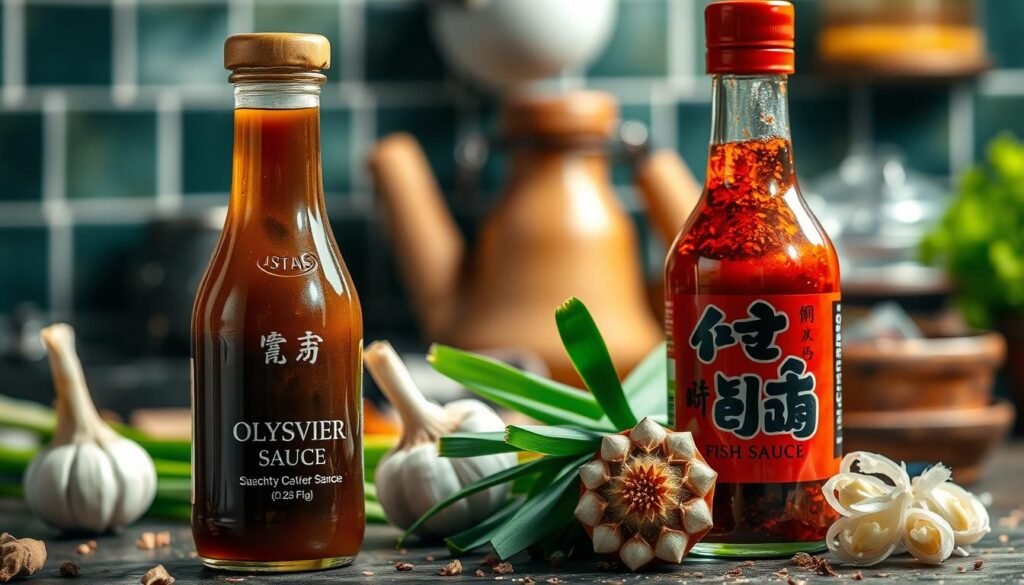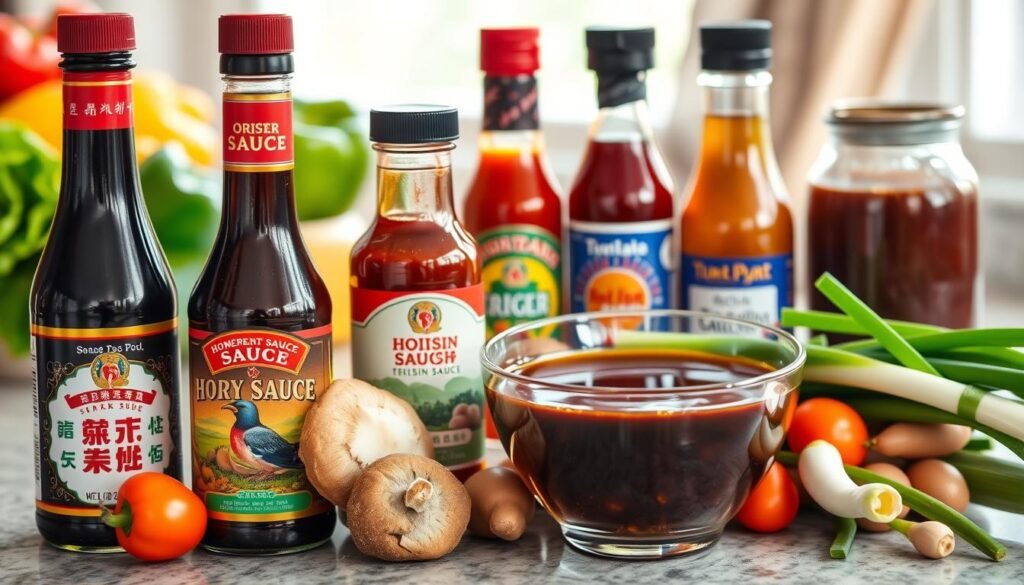
Welcome to your guide on cooking with oyster sauce. Here, you’ll learn how to use this versatile ingredient to make your dishes better. You’ll find recipes and tips for using oyster sauce in both traditional and modern dishes, like mignonette and mushroom oyster sauce.
This guide will take you on a journey through the world of oyster sauce. You’ll see how it’s used in different cuisines. It’s perfect for both seasoned chefs and beginners, helping you master cooking with oyster sauce.
Oyster sauce can be used in many dishes, from stir-fries to marinades. You’ll learn how to add depth and umami flavor to your cooking. Plus, you’ll discover how to mix it with other ingredients for unique flavors.
In this guide, you’ll find detailed recipes and ingredient tables to start cooking with oyster sauce. You’ll learn about different types, like mushroom oyster sauce, and how to use them. With this guide, you’ll become an expert in cooking with oyster sauce and make delicious meals for your family and friends.
What Makes Oyster Sauce a Kitchen Essential
Oyster sauce has a long history, starting in the late 19th century in China. It was first made from oyster extract, sugar, water, and sometimes soy sauce or cornstarch. Now, it’s a key ingredient in many cuisines, like Chinese, Vietnamese, and Thai cooking. Its oyster sauce flavor profile is both savory and sweet.
Oyster sauce is also good for you, being low in calories and rich in umami flavor. Many brands now offer soy free oyster sauce and low carb oyster sauce. This makes it available to more people. Whether you’re a pro chef or a home cook, oyster sauce can make many dishes better.
- Rich, savory flavor
- Low in calories
- High in umami flavor
- Versatile ingredient for various dishes
Oyster sauce’s unique taste and health benefits make it a must-have in kitchens. It’s loved by both home cooks and professional chefs.
Understanding Different Types of Oyster Sauce
There are many types of oyster sauce to choose from when cooking. Each has its own taste and uses. You can check out oyster sauce variations to find what you like best.
Mushroom oyster sauce adds depth and umami to dishes. On the other hand, garlic oyster sauce brings a strong flavor to marinades and sauces.
Here are some key characteristics of different types of oyster sauce:
- Mushroom oyster sauce: rich, earthy flavor
- Garlic oyster sauce: strong, savory flavor
- Low-carb oyster sauce: suitable for low-carb diets

Knowing about the different types of oyster sauce lets you try new recipes. You can find the perfect oyster sauce variation for your cooking.
Essential Ingredients in Traditional Oyster Sauce
Traditional oyster sauce is all about the ingredients. It usually has oyster extract, sugar, water, and sometimes soy sauce or cornstarch. For more on using oyster sauce, check out shrimp stir-fry recipes that often include it.
The quality of oyster sauce can change based on its ingredients and how it’s made. Regional variations of oyster sauce can taste and look different. Some may have more oyster extract, while others might have garlic or ginger.
Quality oyster sauce is thick and dark brown. When buying, look for simple ingredients and no artificial preservatives. Check for ISO or HACCP certifications to ensure quality and safety.
Here are some tips for choosing good oyster sauce:
- Ingredients: Opt for products with few ingredients and no artificial preservatives.
- Production process: Go for traditional methods.
- Regional variations: Try different types to find your favorite.
Creating Your Own Homemade Oyster Sauce
Making oyster sauce from scratch is surprisingly easy. You just need a few simple ingredients. These include oyster extract, sugar, water, and sometimes soy sauce or cornstarch.
To make a basic homemade oyster sauce, mix 1 cup of oyster extract, 1/2 cup of sugar, 1/4 cup of water, and 1 tablespoon of soy sauce in a saucepan. Heat it until it boils, then lower the heat and simmer for 5-10 minutes. After cooling, strain it through a fine-mesh sieve into a bowl. Your homemade oyster sauce is now ready to use.
Here are some benefits of making oyster sauce from scratch:
- Customizable flavor profile
- No preservatives or additives
- Cost-effective in the long run
With your homemade oyster sauce, you can try out different oyster sauce recipes. It’s a fun and rewarding experience for anyone, whether you’re a seasoned chef or just starting out.

So why not try making your own homemade oyster sauce today? With a bit of practice and patience, you’ll soon be enjoying tasty oyster sauce recipes.
Popular Oyster Sauce Variations
There are many oyster sauce variations to try. You can make mushroom oyster sauce for a deeper flavor. It’s made by adding mushroom extract to the traditional recipe.
Garlic oyster sauce is great for adding a strong taste. You can also find low-carb oyster sauce with less sugar. These options let you explore new flavors while keeping the classic oyster sauce taste.
Types of Oyster Sauce Variations
- Mushroom oyster sauce: adds depth and umami flavor
- Garlic oyster sauce: perfect for adding a pungent flavor
- Low-carb oyster sauce: made by reducing the amount of sugar
These variations let you experiment with flavors. Whether you want a low-carb option or more umami, there’s something for everyone.
Trying different oyster sauce variations can elevate your cooking. It’s a great way to make dishes that will wow your guests. So, why not experiment and see what you can create?
| Oyster Sauce Variation | Description |
|---|---|
| Mushroom Oyster Sauce | Made by adding mushroom extract to traditional oyster sauce |
| Garlic Oyster Sauce | Made by adding garlic to traditional oyster sauce |
| Low-Carb Oyster Sauce | Made by reducing the amount of sugar in traditional oyster sauce |
Mignonette and Other Complementary Sauces
When it comes to oyster sauce pairings, you have many options. Mignonette is a favorite, made from shallots, black pepper, and red wine vinegar. It adds a tangy, refreshing taste to dishes. Use mignonette to boost the flavor of your oyster sauce dishes.
Other complementary sauces also pair well with oyster sauce. Soy sauce, hoisin sauce, and fish sauce add depth and umami. Mixing these with oyster sauce creates unique, tasty flavors. Here are some popular oyster sauce pairings:
- Mignonette and oyster sauce: a classic combo for oyster stew or oyster po’ boys
- Soy sauce and oyster sauce: great for stir-fries or noodle dishes
- Hoisin sauce and oyster sauce: sweet and savory, perfect for BBQ or grilled meats
Exploring different complementary sauces and oyster sauce pairings can spice up your cooking. Whether you want a tangy or deep flavor, there’s a mignonette or other sauce for you.

Oyster Sauce vs. Fish Sauce: Understanding the Differences
The debate between oyster sauce vs fish sauce is ongoing. Both are key in many Asian dishes, but they differ. Knowing the differences helps in choosing the right sauce for flavor comparisons and cooking applications.
Oyster sauce comes from oyster extract, sugar, water, and sometimes soy sauce or cornstarch. Fish sauce, however, is made from fermented fish and salt. Oyster sauce tastes more savory and sweet, while fish sauce is umami and salty.
Key Differences in Cooking Applications
Oyster sauce is great for stir-fries, marinades, and sauces. Fish sauce is better for soups, curries, and dipping sauces. For more on the differences, check out this resource.
When to Use Each Sauce
So, when to use oyster sauce vs fish sauce? Here’s a quick guide:
- Choose oyster sauce for stir-fries and marinades for a rich flavor.
- Go for fish sauce in soups and curries for a bold taste.

Best Dishes to Make with Oyster Sauce
Using oyster sauce opens up a world of tasty dishes. You can whip up stir-fries, noodle soups, and more. For instance, a beef and broccoli stir-fry is a great choice. It’s a classic that’s sure to please.
Oyster sauce is great for many oyster sauce recipes. It’s perfect for marinating chicken or pork. Or, use it as a sauce for dumplings or potstickers. Favorites include cauliflower fried rice, fried prawns, and beef fried rice. You can find these oyster sauce recipes on food blogs and websites.
Here are some ideas for best dishes with oyster sauce:
- Stir-fries: Try making a stir-fry with your favorite vegetables and protein, and use oyster sauce as a seasoning.
- Noodle soups: Add oyster sauce to your favorite noodle soup recipe for an extra boost of flavor.
- Marinades: Use oyster sauce as a marinade for chicken or pork before grilling or roasting.

Storage and Shelf Life Tips
To keep your oyster sauce fresh, store it right. Keep it in a cool, dry spot, away from sunlight and heat. This keeps the sauce quality high and prevents spoilage.
Always check the expiration date. Look for signs of spoilage like bad smells or sliminess. If you see these, throw the sauce away. Right storage can make oyster sauce last longer.
Extending Shelf Life
Store oyster sauce in the fridge or freezer to slow down fermentation. This keeps it fresh longer. Here are some tips:
- Store it in an airtight container to prevent contamination and spoilage.
- Keep it away from strong-smelling foods, as oyster sauce can absorb odors easily.
- Use a clean spoon or pourer to dispense the sauce, and avoid cross-contamination with other foods.

Follow these proper storage methods and watch for signs of spoilage. This way, you can enjoy your oyster sauce longer and keep its rich flavor.
Common Mistakes to Avoid When Using Oyster Sauce
When using oyster sauce, it’s key to know common mistakes. Using too much can ruin the taste of your dishes. Start with a little and add more if needed.
Another error is not cooking it enough. This can make the sauce taste raw or bitter. Oyster sauce tips suggest cooking it well to get that deep, savory taste. Here are some common mistakes to avoid:
- Using too much oyster sauce, which can overpower the other flavors
- Not cooking the oyster sauce long enough, resulting in a raw or bitter flavor
- Not storing oyster sauce properly, which can affect its quality and shelf life
To steer clear of these common mistakes with oyster sauce, follow the right cooking and storage methods. Being aware of these mistakes helps make your dishes tasty and flavorful. Always use oyster sauce in moderation and cook it for the right time to get the best flavor.

By following these oyster sauce tips and avoiding common mistakes, you can master cooking with oyster sauce. You’ll make dishes that wow your family and friends.
Healthy Cooking Tips with Oyster Sauce
Using oyster sauce in cooking can be healthy if done right. It’s high in sodium and sugar, but in small amounts, it’s okay. To keep your diet balanced, use portion control and mix different foods. You can also cut down on sugar and sodium by making some changes.
Try using less oyster sauce and add more veggies or lean proteins. This makes your dish healthier and tastier. As you learn to cook with oyster sauce, keep these tips in mind:
- Use oyster sauce to add flavor, not as the main ingredient.
- Balance your meals with various foods, like veggies, lean proteins, and whole grains.
- Focus on balanced meal planning to get all the nutrients you need.
By following these tips and controlling portions, you can enjoy oyster sauce’s flavor without harming your health. Always check the label for low-sodium options to make changes easier.

With a bit of creativity and planning, you can make tasty, healthy meals with oyster sauce. So, try new recipes and enjoy the flavor of oyster sauce while keeping your diet balanced.
Substitutes for Oyster Sauce in Various Recipes
Looking for substitutes for oyster sauce? You have several options. If you’re missing oyster sauce in your recipe, try soy sauce, hoisin sauce, or fish sauce. These can add depth and umami flavor, though they won’t taste exactly like oyster sauce.
Some recipes without oyster sauce use soy sauce and sugar as substitutes. You can mix these ingredients to find the perfect flavor for you. Here are some ideas:
- Soy sauce: Use it in the same amount as oyster sauce.
- Hoisin sauce: It’s sweeter, so use less of it.
- Fish sauce: It’s strong, so use it sparingly and mix with other ingredients.
Keep in mind, substitutes for oyster sauce won’t taste the same. But with some trial and error, you can find a good mix. For more on oyster sauce alternatives, check out online resources.

Conclusion: Mastering the Art of Cooking with Oyster Sauce
Mastering the art of cooking with oyster sauce opens up a world of flavors. It’s a journey that can make your dishes stand out. By learning about oyster sauce recipes and how to use it, you can impress anyone.
Oyster sauce is great for many dishes, like stir-fries and marinades. It’s a versatile ingredient that can make your cooking better.
Whether you’re a pro or new to oyster sauce, the key is to try new things. Taste and adjust until it’s just right for you. With this guide, you’re ready to master the art of cooking with oyster sauce. Your dishes will be so good, everyone will want more.





